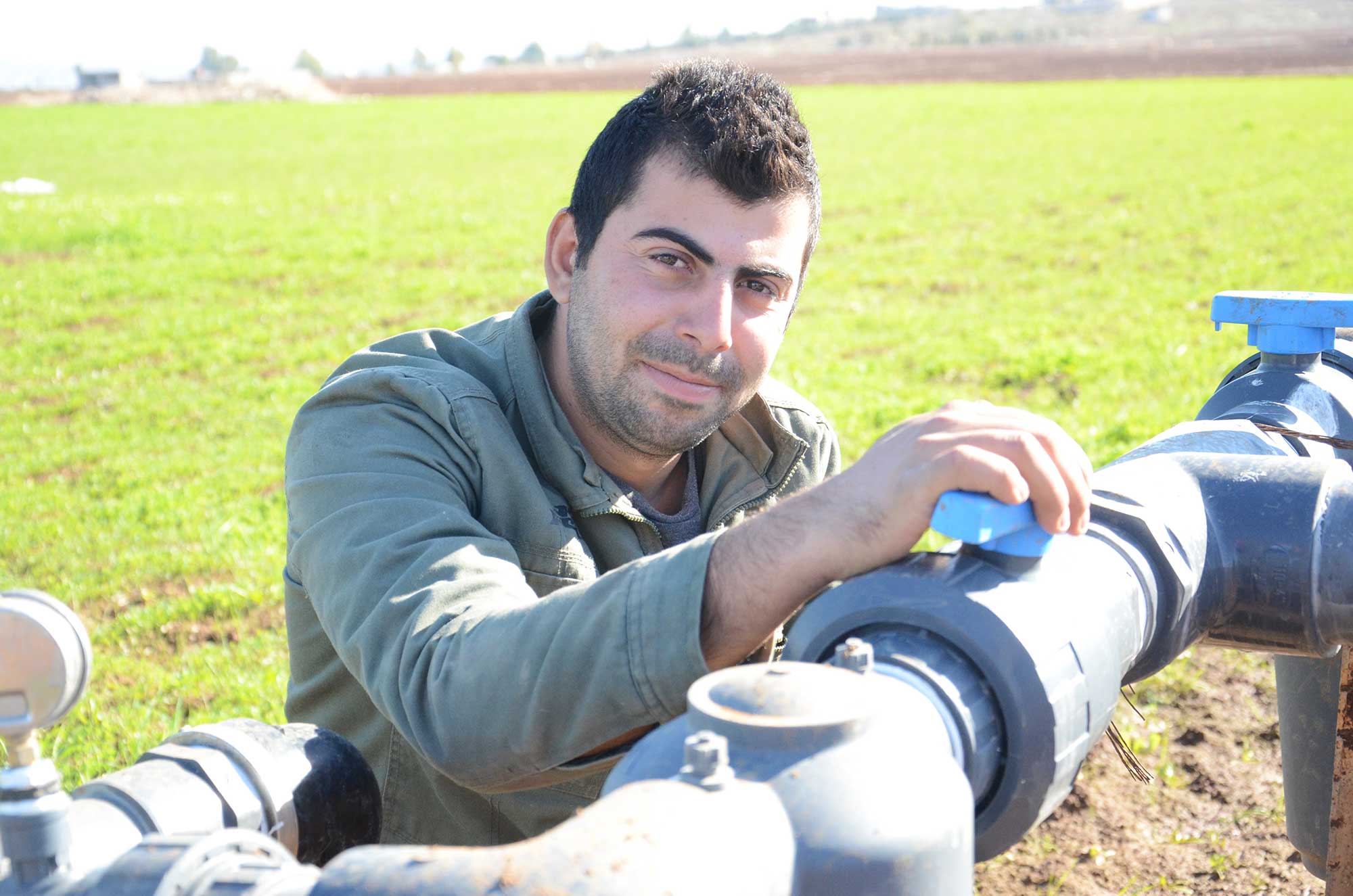1985 – 1994: Pioneering Agricultural Development in Palestine
First Step: Reclaiming the Land
In 1985, Anera Jerusalem consisted of three staff members working in a small rooftop office in East Jerusalem that also served as the country director’s apartment. When Ibrahim Matar was hired as deputy Middle East representative, he understood the challenges and the responsibilities. Anera was the biggest non-profit among only a few others, and the West Bank and Gaza were eager for development. But times were difficult, economically and politically. Ibrahim realized that creativity, resourcefulness, and solid partnerships were the most important tools for development in the region.
Ibrahim explained, “At that time, Israel was expanding its settlements under the pretense of ‘security.’ The only defense Palestinian landowners had against these measurements was land reclamation.”
So Anera set to work helping farmers reclaim hundreds of acres, mostly in the southern West Bank, with imported bulldozers and tractors. It was a pioneer project that had a life-changing impact on the farmers and villages. That impact on Palestine agriculture can still be seen today.
Other non-profits and local cooperatives soon followed Anera’s lead. “Anera is still remembered in land reclamation conferences to this day as the pioneer. Older farmers still feel indebted to Anera,” explained Ibrahim.
Anera’s pioneer spirit didn’t stop at reclamation. Anera introduced drip irrigation to deal with the scarcity of the water supply, which was under Israeli control. Farmers in the West Bank had not heard of the system and were reluctant to adopt it. So the Anera staff planted a demonstration plot to prove the system’s efficiency and succeeded in convincing the farmers of its value. The system eventually helped thousands of farmers.
Developing a Loan Program for Farmers
To complement the reclamation program and reach out to even more farmers, Anera ventured into yet another unprecedented quest in the late eighties: a revolving loan program that targeted small farmers through a close partnership with the Bank of Palestine.
Mazen Dabbagh, Anera’s business development manager explained: “In 1991, the Palestinian Authority did not exist so there was no Ministry of Agriculture or any official body that could help farmers. Agricultural cooperatives were the only source of aid. So Anera worked with them to develop the sector. Our goal at the time was to design a loan program to help small entrepreneur farmers who were members of these cooperatives.”
The microfinance program was implemented in five districts in the West Bank: Jenin, Tulkarem, Ramallah, Hebron and Qalqilia, and two in Gaza: Khan Younis and Beit Lahia.
“We created a loan guarantee program in partnership with the Arab Bank in order to encourage more lending to the agricultural sector, which was always viewed by banks as a risky business. Anera deposited loan capital in a special bank account and used only when a farmer failed to pay back a loan. We were the first to propose such a project.” The loan program still exists today with thousands of beneficiaries.
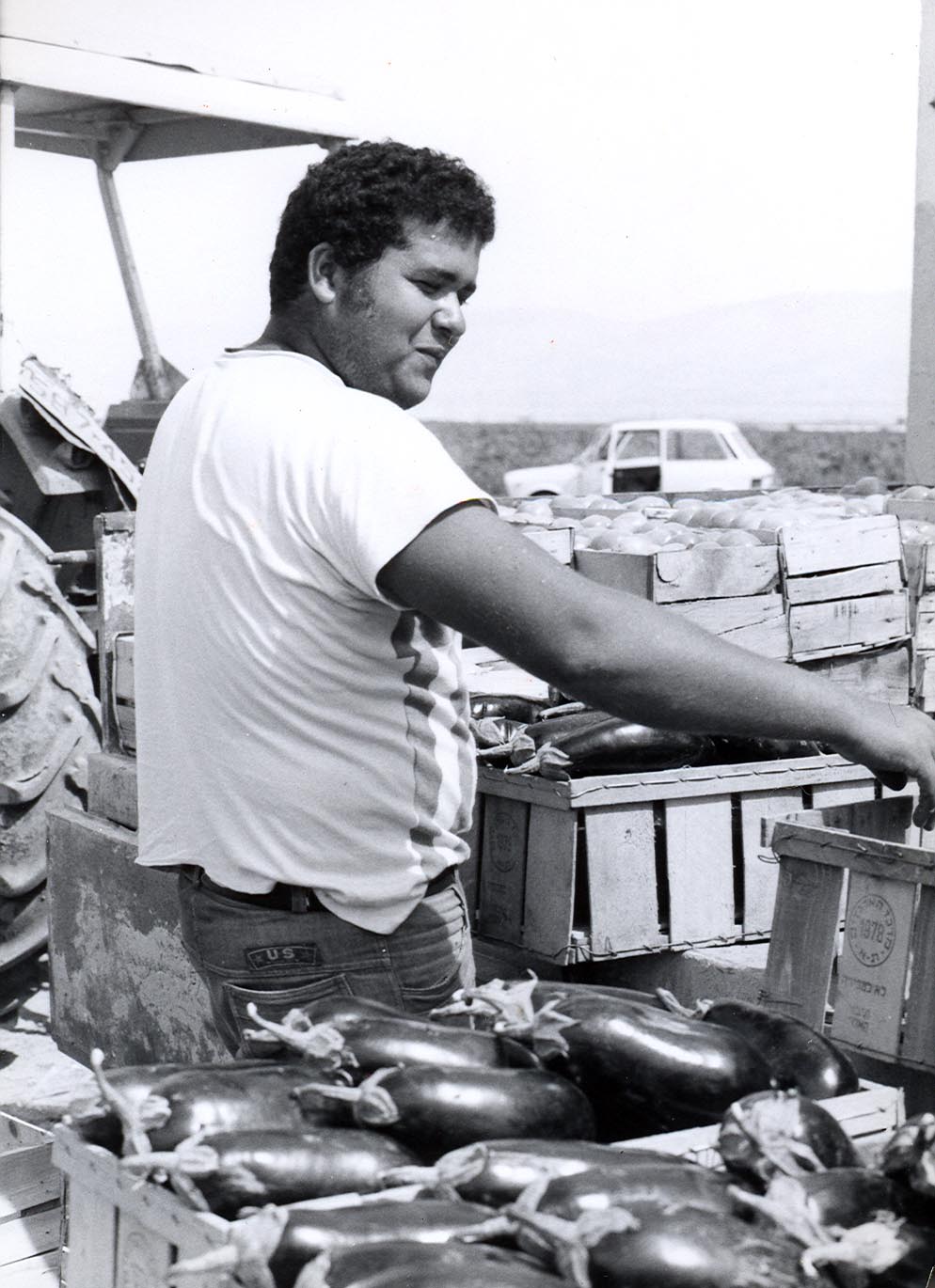

Establishing Palestinian Dairies
The First Intifada erupted in the late eighties and continued until mid-1991. There was a strong boycott of imports, which left a huge shortage of dairy products in the West Bank. Between 1991 and 1994, Anera’s seven staff members helped five cooperatives establish dairies to encourage farmers to become producers and promote best practices in dealing with milk-based products. The dairies were set up around Bethlehem, Nablus, Tulkarem and Hebron.
“We bought pasteurizing equipment for five West Bank cooperatives from a very well-regarded company called Alfa Laval and we brought in experts from the same company to train our farmers on how to operate the machinery,” says Ibrahim Matar. “We also established mobile veterinary clinics and labs to guarantee high-quality products – a unique concept in the West Bank.”
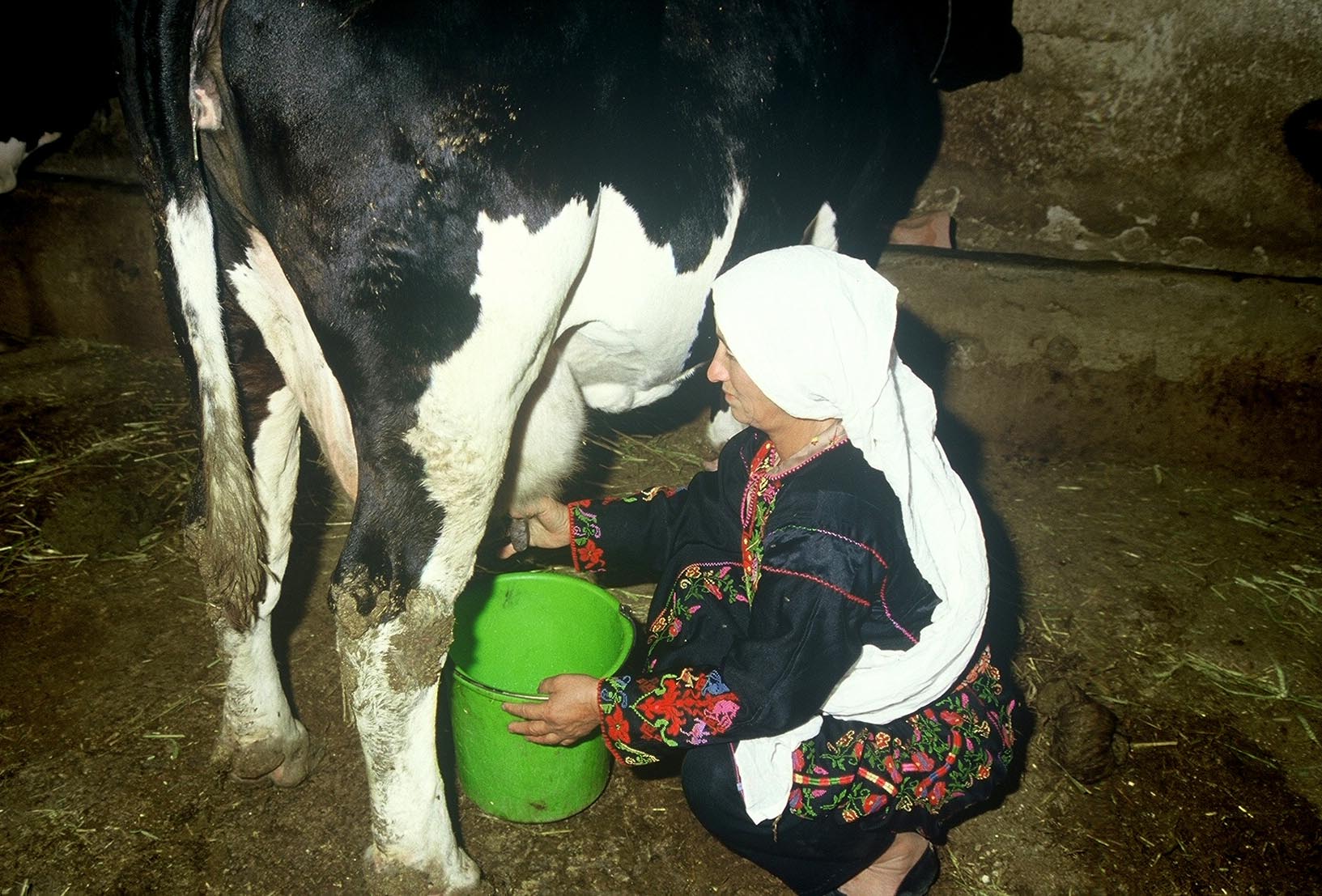

The five dairies became self-sufficient and each produced over 1.1 million gallons of milk per day. But their real value was in their impact on the local community and economy. Everyone benefited – cooperative members, dairy farmers, milk suppliers, fodder manufacturers, veterinarians and experts, as well as marketing people, shopkeepers and consumers.
“By 1994, Anera had established its place as the pioneering organization in rural development in Palestine,” says Mazen Dabbagh who managed one of Anera’s projects at the time. “Anera was synonymous with agricultural projects. It had projects from Jenin in the northern West Bank all the way to Rafah in southern Gaza.”
Irrigating Jericho during the Second Intifada
Water scarcity remains one of the greatest challenges to Palestinian agricultural development. With an increasing population, harsh climate change, urbanization and little to no control over their own water resources, Palestinian farmers are forced to either adapt their farming techniques to water scarcity or abandon farming altogether.
Nearly 13 years ago, Anera took on a tremendous challenge to install a state-of-the-art irrigation system in Jericho, which is located in the West Bank’s Jordan Valley that endures the area’s driest climate.
1995 – Present: Supporting Sustainable Projects
The Ein Al-Sultan project came at an opportune time with yet another Intifada erupting in the West Bank, making mobility and access to natural resources even more difficult. Jericho was re-occupied by Israel in 2001, and Palestinian traffic was controlled by military checkpoint surrounding the city.
Boasting a little oasis of citrus and banana groves, and bountiful palm trees, many of Jericho’s inhabitants relied solely on agriculture for their income—and they still do. They depend mostly on the largest of the city’s five springs, known as Ein Al-Sultan. But limited water resources and the deterioration of water networks there had gravely threatened the sector.
With funding from the UN and Jericho municipality, Anera was able to modernize Ein Al-Sultan’s decayed water system and transform it into a sophisticated and reliable system that delivers a steady flow of water to 900 families every day.
Before the system was finished in 2006, farmers relied on an outdated system of exposed concrete canals, which affected the flow and quality of water, let alone caused huge water losses.
“This modern system has helped many farmers get back on their feet again and tend to their fields, as they now receive fresh water at a constant pressure and flow,” explains Mazen.
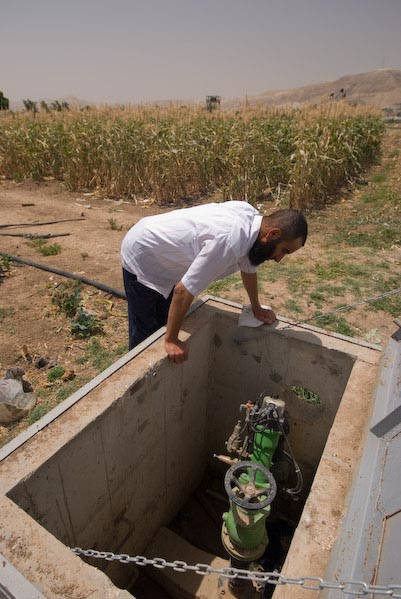

Sharing Knowledge, Gaining Land
Not only has the Israeli-Palestinian conflict taken a toll on Palestinian farmers’ mobility, it has often separated them physically from one another. As Palestinian communities remain separated by military checkpoints, illegal Israeli settlements and a 700 km-long separation wall, farmers have often found themselves isolated and out of touch with the latest developments and technologies in agriculture.
In 2012, Anera, in partnership with the Ministry of Agriculture, embarked on a unique program that introduced basic knowledge-sharing tools to keep farmers across the West Bank connected and up to date. The 15-month project was part of a bigger regional program funded through KariaNet and IDRC and implemented across the Middle East and North Africa.
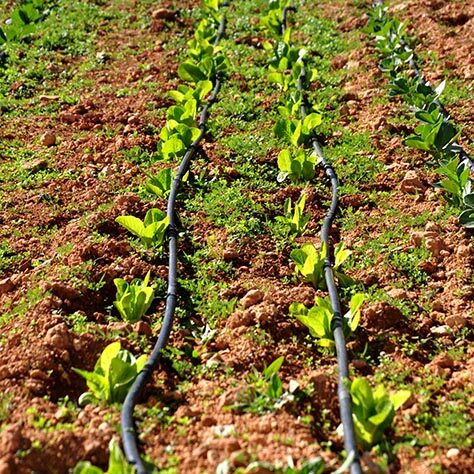

The program’s ultimate purpose is to encourage land reclamation in mountainous areas where water is scarce and resources are limited. It has encouraged new farmers to reclaim their abandoned lands by connecting with others to learn how they succeeded. The program produced a series of short films documenting the best farming practices of successful farmers, a feature-length documentary, two first-of-a-kind farmers’ conferences, farmer wives’ meetings and pages on Facebook and Youtube for sharing of materials and ideas.
Naser Qadous, Anera’s agricultural project manager, explains: “Because there are physical barriers disconnecting our communities, a huge number of farmers, especially those who are younger or newer to the field, remain under-informed and in need of guidance. That is why there is a need among Palestinian farmers to communicate and exchange knowledge in a safe and vibrant environment that transcends physical barriers, namely social media networks.”
Introducing Green Tactics to Combat Water Scarcity
Anera’s newest program for helping West Bank farmers is a three-year project that will reuse water from a wastewater treatment plant to irrigate over 700 acres of farmland in the Jenin area and build a water reservoir and water distribution networks that will benefit hundreds of families. It will also introduce new crop varieties, conduct training and awareness sessions and organize study tours to help build farmers’ awareness of best practices.
“Due to the scarcity of water, farmers in Jenin are forced to purchase water at very high costs for irrigation or abandon their lands,” says Naser. “This project helps decrease the use of drinking water for farming, and eventually increase the income of farming families and ease their hardships. Hopefully, it will encourage more farmers to reclaim their lands and become productive.”
Water scarcity is even a graver issue in besieged Gaza, coupled with movement restrictions, overpopulation, unemployment and overwhelming poverty. In an attempt to relieve some of the burden of poverty in Gaza, Anera has provided poor families across southern Gaza with greenhouses, seedlings and irrigation systems to grow their own food. With 50% of Gaza’s population battling unemployment, the program attempts to relieve some of the financial pressure people feel by helping them become self-sufficient. The Gaza greenhouses help families put food on their table no matter the season or political situation.
What lies ahead for Anera is a continued investment in this sector that has proven its steadfastness and inexhaustible bounty. Amidst the many hardships faced by Palestinians, the land is a fundamental source of employment and economic security. After more than 40 years of commitment to the agricultural sector, Anera is determined that Palestinian farmers shall continue to reap the fruits from their own labor and devotion.
